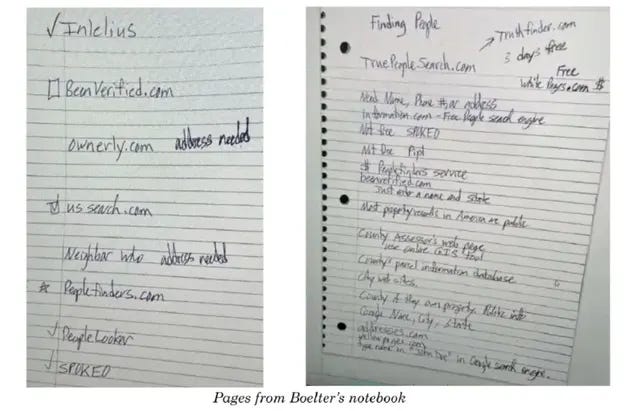Did Data Brokers Aid a Recent Murderer?
The same tools used to spam and doxx are being used to kill and stalk
Here's a grim story that many of you probably already saw:
A Minnesota state representative and her husband were recently murdered, most likely for political reasons.
Most of our US readers are likely familiar with that story, at least at a high level because it was all over the news when it happened. It's frightening when you stop to think about it, especially considering many of us are engaged in politics or the public space in some form. The idea that you can be killed for doing that is hard to comprehend.
There is, however, one detail of this story that hasn't gotten the attention it deserves:
The killer may have used data broker websites to help track down his victims.
The FBI Says the Killer Had a List of Data Brokers
On June 14, 2025, Minnesota state representative Melissa Hortman and her husband were gunned down in their home. The same night, state senator John Hoffman and his wife were also shot, likely by the same perpetrator. Hoffman and his wife (barely) survived.
The FBI says the suspect (Vance Boelter) had handwritten notes listing more than 45 public officials that he planned to target. Also included in his notes? Eleven websites that he used to find home addresses and personal information on his targets. The data broker website names in his notes are itemized below in the section on "What Can You Do?"
Sadly, This Isn't New
This isn't the first time data broker sites have been used to track down a victim. Here are two of the more high profile examples:
In 2020, a man used publicly available info to find and attack federal judge Esther Salas. The judge survived, but her son was killed and her husband was shot (source).
In 1999, Amy Boyer was murdered by a stalker who bought her data (including her Social Security number) online for $45. (source)
Admittedly, these cases are not very common (or at least not widely reported, to be completely accurate). But each case points to the same underlying risk: easy access to your data online can result in physical harm.
What Can You Do?
You can’t stop data brokers from existing. But you can make yourself harder to find.
Here’s a high privacy ROI move:
Start by opting out of the 11 broker sites listed below. Those were the exact services used (or intended to be used) by a the alleged killer of Hortman to track down his targets.
If you want help automating the removal process, we recommend DeleteMe. We've been a customer for around 5 years. They do a solid job of automatically removing your data from data broker sites. It saves a lot of time. There are other services out there that you're welcome to try out (but we can't vouch for them).
Click here for 20% off a subscription to DeleteMe.
Plenty of people do DIY data removal. It's a reasonable option if you don't want to spend money, have time to do the initial removals, and then can stay on top of things going forward. The follow up is important because removal is only good for 6-12 months in our experience. You need to be prepared to check these sites 1-2x per year. Services like DeleteMe eliminate the need to follow up (they also search up to 750 sites, depending on the plan you select).
If you go the DIY route, focus on the sites that the killer used, which are:
If You Want to See What Others Can Find About You, Start Here
One of the most effective ways to protect yourself is to think like an attacker.
Removing your data from data broker sites is an obvious great and initial move. But there’s more to hiding from Bad Actors than that.
That’s why we put together a guide on how to run an OSINT scan on yourself. That allows you to use the same open-source tools and search tactics that investigators, journalists, and unfortunately, Bad Actors use every day to find and track targets.
It walks you through how to check what’s out there about you online:
Your home address.
Your phone numbers.
Your relatives.
our digital footprint.
The goal? To help you get ahead of potential problems, allowing you to remove what shouldn’t be public, lock down what’s exposed, and become a harder target.
Get started here.
A Rule to Rein in Data Brokers Was Recently Scrapped. Will This Change That?
The U.S. Consumer Financial Protection Bureau (CFPB) was exploring a rule that would’ve restricted how data brokers collect and sell sensitive personal information.
But that effort was recently shut down. Acting director Russell Vought canceled the rulemaking process, effectively ending the agency’s push to more tightly regulate this industry.
The proposal had aimed to treat certain data broker practices, like selling detailed consumer profiles, as subject to existing consumer protection laws.
Supporters argued it was a long-overdue step toward holding the industry accountable. Critics worried it would overextend the agency’s authority.
Now, with a state representative murdered and data broker sites possibly used to help carry out the crime, the question is back on the table:
Will lawmakers revisit these protections? And if not now, when? We shall see.
Prevention is the Key
What happened in Minnesota was tragic. And while we don’t get to control the world we live in, we do have control over how we respond to its risks.
Use this case as a nudge to take action. Even if you're not a public figure, you are still at risk of real world physical attacks, whether from colleagues, your political activities or the rando at the grocery store. The harder you are to find, the lower your risk.
Taking pro-active steps to protect your personal information isn’t overreacting or being paranoid. It’s prudent planning for you and your family.
Start today. Make yourself harder to find. And become a harder target.
Here’s some further reading on related topics:
Friendly Ask
If this post gave you a wake-up call, it’ll likely do the same for someone you care about. Please forward it to a friend or family member and help them take one step toward being harder to find, and safer because of it.
Looking for help with a privacy issue or privacy concern? Chances are we’ve covered it already or will soon. Follow us on X and LinkedIn for updates on this topic and other internet privacy related topics.
Disclaimer: None of the above is to be deemed legal advice of any kind. These are *opinions* written by a privacy attorney with years of working for, with and against Big Tech and Big Data. And this post is for informational purposes only and is not intended for use in furtherance of any unlawful activity. This post may also contain affiliate links, which means that at no additional cost to you, we earn a commission if you click through and make a purchase.
Privacy freedom is more affordable than you think. We tackle the top Big Tech digital services and price out privacy friendly competitors here. The results may surprise you.
We just published a new guide on how to bulletproof your inbox using disposable email addresses and aliases. It covers the best tools, when to use (and not use) them, and how to combine aliases with other privacy tech for max protection. There are even a few bonuses included. Grab a copy here at the special intro rate of $19. The price will go up at the end of June.
Check out our Personal Privacy Stack here. It’s a simple, easy way to start De-Googleling your life.
AI scams are here and getting more sophisticated. One of the best things you can do to protect yourself is to remove your personal information from Google and the data broker sites. That starves the scammers of vital information, making you a much harder target. You can DIY, or pay a reasonable fee to DeleteMe to do it for you. Sign up today and get 20% off using our affiliate link here. We’ve used DeleteMe for almost five years and love it for the peace of mind. It’s also a huge time saver.
If you’re reading this but haven’t yet signed up, join the booming Secrets of Privacy community for free (2.1K+ subscribers strong) and get our newsletter delivered to your inbox by subscribing here 👇










Great read! An unregulated data broker you might be interested in is - Tea App and Are We Dating the Same Guy. The privacy violations and doxxing have driven some men to suicide.
https://www.itv.com/news/utv/2024-05-10/are-we-dating-the-same-guy-the-facebook-group-thats-raising-concerns
This is very useful information for these times well worth a look